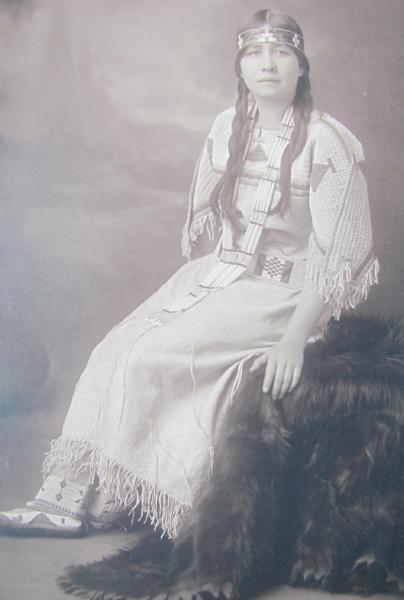- Ella Cara Deloria
- Ella Cara Deloria
Contributed to
-
Beliefs about day and night (1887)
People don't know what causes night and what causes day, aside from the sun. It is something mysteriousness and awe-inspiring, which is why night and day are considered sacred.
-
Waȟʼáŋksiča, a strange animal (1887)
Once upon a time, the people buried their dead on a hill and went to live elsewhere. A long time later, someone discovered that the dead had been moved. In searching for the bodies they discovered them in a labyrinthine cave belonging to the waȟʼáŋksiča.
-
Horse racing (1887)
Horse race betting could include arrows, household items, or the horses themselves. The bettors would select a well-skilled rider to compete. Sometimes if the loser refused to give up whatever they had bet, the men would fight and even kill each other.
-
How the Indians cured the sun (1887)
When people noticed the sun was losing light and the land was getting dark, they panicked and shot their guns into the sun. In doing so, they began to relight the sun, making it strong and bright again.
-
Return of the nighthawk in the spring (1887)
Nighthawks return after other birds in spring, and people would anxiously wait for them. When the nighthawks fly back, it is time to hunt again, because their return is the message that the animals have fattened up.
Mentions in the recordings
-
Ella Deloria Y.W.C.A. Uŋ Oíhdaka
Ella Deloria talks of her work with the Y.W.C.A.
in
-
Miss Deloria All Saints School, Sioux Falls, én thokáheya wayáwa nakúŋ Oberlin College, Ohio, hehán Colombia University, New York, etáŋhaŋ wóuŋspe ihúŋnikiye.
Miss Deloria went to school at All Saints in Sioux Falls, and is a graduate of Oblerin College, Ohio, and Columbia University in New York.
in
-
Kʼa Miss Deloria táku thokáheya čhažéyate čiŋ hé wikhóške ičháǧapi hená hékta khúŋšitkupi thawíčhoȟʼaŋpi, wóuŋspe, oíhduhe kʼa wíyukčaŋpi kiŋ kičhí íčhithokeča oyáka.
The first thing Miss Deloria mentions is that she is talking about today's young woman, whose generation differs from their grandmothers' in work, education, behavior, and beliefs.
in

